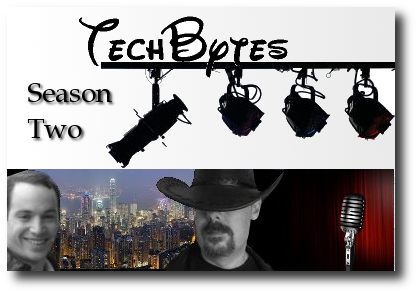Friday, August 3rd, 2012, 3:39 pm
TechBytes Episode 73: Richard Stallman on Corporate Power and the US Political System

Direct download as Ogg (11:07,4.5 MB)
Summary: The last part of our interviews series with Richard Stallman
TODAY we cover some more political issues including matters of law.
Secrets
Dr. Roy Schestowitz: What is your take on the notion of “trade secret”?
 Dr. Richard Stallman: Well, since I think people have a right in general to keep secrets, that means they’re also gonna keep some trade secrets. And I don’t see any harm in this necessarily, for instance if you have a business and you don’t want to say who your customers are, well, OK, in general there is no reason why you should have to say who your customers are. On the other hand, when there is a public interest reason for certain information to be made available, that completely outweighs the businesses’ desire for secrecy. For instance, if you consider fracking, which is injecting fluids underground to push out natural gas. Well, some of those fluids are toxic and they have poisoned wells; they poisoned aquifers; they made people sick. But the companies say, “we don’t have to tell people what we’re injecting”. Well, as far as I’m concerned, what those companies want is of no importance compared with public health.
Dr. Richard Stallman: Well, since I think people have a right in general to keep secrets, that means they’re also gonna keep some trade secrets. And I don’t see any harm in this necessarily, for instance if you have a business and you don’t want to say who your customers are, well, OK, in general there is no reason why you should have to say who your customers are. On the other hand, when there is a public interest reason for certain information to be made available, that completely outweighs the businesses’ desire for secrecy. For instance, if you consider fracking, which is injecting fluids underground to push out natural gas. Well, some of those fluids are toxic and they have poisoned wells; they poisoned aquifers; they made people sick. But the companies say, “we don’t have to tell people what we’re injecting”. Well, as far as I’m concerned, what those companies want is of no importance compared with public health.
When there is an important reason companies should be ordered to say what they’re doing, because their desire is only enough in a situation where there is no particular reason on the other side. If it doesn’t matter to [the public], then sure, let them keep it a secret. But when it matters in important way to others, then the companies’ desire is not important.
Right, so basically that’s why it is diminished as soon as there is an externality.
Right, you see, when you’re doing something that’s going to affect public health, you haven’t got a right to keep a secret–not when anything important is at stake.
Right, what I mean to say, there is this thing of privacy right which corporations are not supposed to have, it’s really for people. But I suppose when there is an externality such as the public and there is an issue of public health all the taxpayers — paying the government to deal with certain companies — they do have a sense of entitlement to get information and that’s really more of the transparency…
But an important reason outweighs and unimportant one. All else being equal, I see no harm if… sorry, if there’s no powerful reason why a company should have to reveal something, then let it keep a secret if it wishes. But whenever an important reason shows up for requiring this information to be disclosed, tough on the company.
Politics
The last question I wanted ask it’s like, which is the government or state leader — either in the past or the present — that inspires you the most?
I don’t understand.
I’m just saying, which is the government or state leader — either in the past or in the present — which inspires you the most?
I don’t know how to answer a question like that. I’d have to think about it for a while to remember… you know, because if I read about some leader, that doesn’t mean I’ll remember today who that person is. And I might have felt, “wow, this is really a great example of doing the right thing,” but I don’t remember them. So my brain doesn’t work right for a question like that, sorry.
Okay, so I’ll ask a different question instead. Which is the person you would endorse for the presidency in 2012?
Oh, Jill Stein.
I know that.
In fact, I already have. She is the Green Party candidate. Well, I’d like to say why I endorse Jill Stein.
Okay, carry on.
Obama is basically right wing. He mostly does what companies want. And I won’t support a right-wing candidate. And of course Romney is even more right wing, but I’m not going to support a ring-wing candidate merely because he is a little less right wing than somebody else.
Obama protects torturers. Obama personally orders assassinations away from battle fields. Obama basically supports the banksters. Obama was bending over backwards not to prosecute them for crimes–the banks had committed gross crimes connected with foreclosures, and he wanted to impose a settlement. Some state attorneys general refused to go along with the settlement, so he had to compromise a little; he said there would be an investigation, but he gave the investigation too little funds and it looks like it’s going to really go nowhere. And this is after the banks took thousands of people’s houses based on lying in court. So he’s protecting them after they’ve committed tremendous crimes that have harmed probably hundreds of thousands of Americans (if not millions, but I don’t actually know). Then, to go beyond that, last year he joined in advocating deficit reduction as a goal when of course, when there’s a recession what’s needed is deficit spending; that’s the only way to get out of it. Of course he couldn’t force the House of Representatives, which is controlled by the Republican Party, to vote for something, but he could have championed the right policy. That he could have done by himself, but he didn’t. So he is, I’d say, a Republican although he calls himself a Democrat. And not only that but he said nothing about the danger of global heating, and he’s pushing in every possible way to build the tar sands oil pipeline from Canada to the Gulf of Mexico. He really is on the side of the oil companies, which are trying to fry our planet.

Dr. Jill Stein of the Green Party is in the trenches fighting for the people (source: AP)
Here ends the series of interviews with Richard Stallman. We’ll have more guests shortly.
We hope you will join us for future shows and consider subscribing to the show via the RSS feed. You can also visit our archives for past shows. If you have an Identi.ca account, consider subscribing to TechBytes in order to keep up to date.
As embedded (HTML5):
Keywords: politics gnu fsf privacy jillstein
Download:






 Filed under:
Filed under: 

